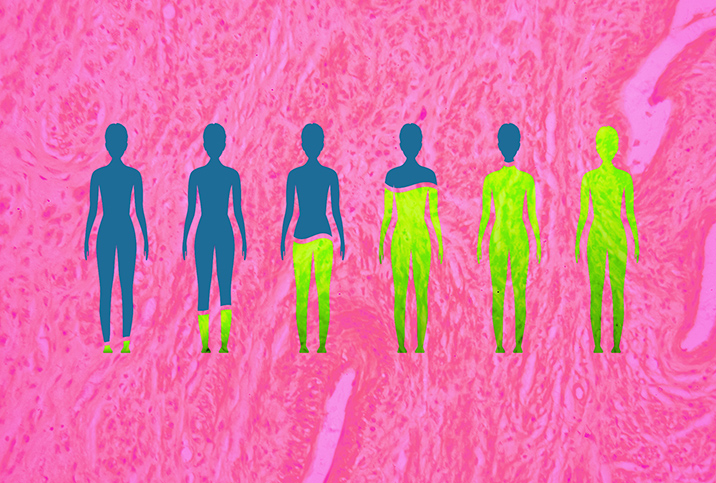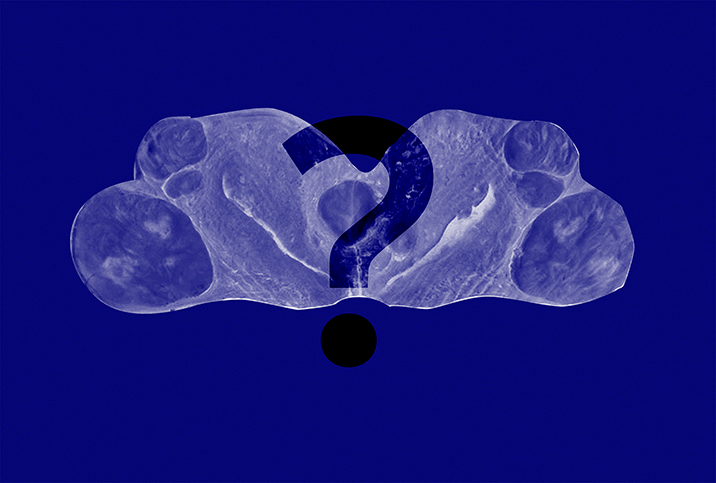What Happens to Fibroids During Menopause?

Menopause can cause many uncomfortable symptoms, such as hot flashes, vaginal dryness and mood changes. And to add to the list: Fibroids could be an issue.
"Fibroids are growths made of smooth muscle cells and fibrous connective tissue of the uterus," explained Katerina Shkodzik, M.D., an OB-GYN in Belarus and a medical advisor at Mira, a women's health monitoring platform.
There's often an expectation that fibroids during menopause will disappear, which leads many women to adopt a "wait and see" approach rather than seeking treatment. However, this isn't the reality for all women. While fibroids are more common in premenopausal women, that doesn't mean they won't develop during or after menopause. If fibroids during menopause are causing you symptoms, don't ignore them.
What causes uterine fibroids?
"Fibroids are very common, and between 40 percent to 80 percent of women will develop fibroids in their reproductive years," said Shaghayegh M. DeNoble, M.D., a board-certified gynecologist trained in minimally invasive gynecologic surgery in New Jersey. "These benign tumors can be solitary or grow in groups. They also can vary in size, from tiny seeds to large tumors the size of a watermelon."
It's unclear what causes fibroids or what causes them to grow, but there are certain factors that can put you at higher risk of developing them. A family history of fibroids, being overweight or obese, and no history of pregnancy are all risk factors, according to Shkodzik.
DeNoble added that environmental exposures to endocrine-disrupting chemicals, a diet heavy in red meat, alcohol use and hypertension can all increase a woman's risk of developing fibroids.
Fibroids don't always present with symptoms, but if they do, you may experience heavy bleeding, painful periods, pain during sex, frequent urination, back pain and pelvic discomfort. If fibroids occur without symptoms, there may not be any need for treatment. However, if fibroids are causing you pain and discomfort or they become large, treatment should not be delayed as they can cause further complications, such as anemia and infertility.
How do fibroids affect menopausal women?
During perimenopause, the likelihood of developing fibroids can increase, but this is largely dependent on hormone levels. The ovarian hormones estrogen and progesterone "feed" fibroids and cause them to grow, DeNoble said.
"During the earlier years of perimenopause, fibroids may grow and symptoms such as abnormal bleeding may become more prominent since there are larger fluctuations in hormones during the several years leading up to the last menstrual period," DeNoble explained. "In later perimenopause years and during menopause, the decline in ovarian hormones can lead to shrinking of fibroids and diminished symptoms."
The decline in estrogen often causes fibroids to reduce in size or disappear, Shkodzik said. When fibroids are small, they are not usually associated with any symptoms.
However, you shouldn't rely on menopause to treat your fibroids. A large 2015 cohort study published in the European Journal of Epidemiology found that of the 610,604 postmenopausal women who were followed over the course of about 11 years, 3,561 were admitted to the hospital with a confirmed diagnosis of fibroids. Furthermore, the study showed that obesity could double the risk of developing fibroids. DeNoble explained that this is likely to be a result of a higher estrogenic environment created by adipose tissue, which can allow fibroids to grow even after menopause.
"Women with fibroids who are using postmenopausal hormone replacement therapy may also not have a regression in their fibroids, but this can depend on the type and dose of hormones used," DeNoble said.
What treatment options are available?
Your treatment will depend on the severity of your symptoms as well as the size and location of your fibroids. If you have mild symptoms, some simple lifestyle changes can be helpful. If obesity is a risk factor, losing excess weight and modifying your diet can have huge benefits.
"Progestin-releasing IUDs can help alleviate abnormal or heavy bleeding during this time," DeNoble said. "Other hormone modulating medications available for treatment of fibroids may also benefit these women."
Birth control pills may be used to reduce heavy bleeding, pain and cramping, but they will not cause the fibroids to shrink, and some symptoms can remain. Shkodzik recommended surgery, especially if a woman presents with abdominal discomfort or abnormal uterine bleeding, as surgery tackles the issue head-on.
Depending on the size and number of fibroids you have, a myomectomy may be carried out as a laparoscopic procedure. This operation allows for a surgeon to remove the fibroids without removing your uterus, making it suitable for women who still wish to conceive in the future.
In the event of heavy bleeding or large fibroids that don't respond to other treatments, a hysterectomy may be carried out. This is the most permanent solution, because once the uterus is removed, very rarely will a fibroid grow back. In most cases, your symptoms will be completely resolved.
When is it cause for concern?
Research shows that abnormal uterine bleeding (AUB) accounts for 70 percent of all gynecological consultations in perimenopausal and postmenopausal women. While AUB is a common symptom of fibroids, it is also linked to more serious health issues, such as cancer.
Fibroids during menopause shouldn't be a major concern and are usually benign but DeNoble encouraged women to seek testing immediately to rule out cancer and other serious complications.


















